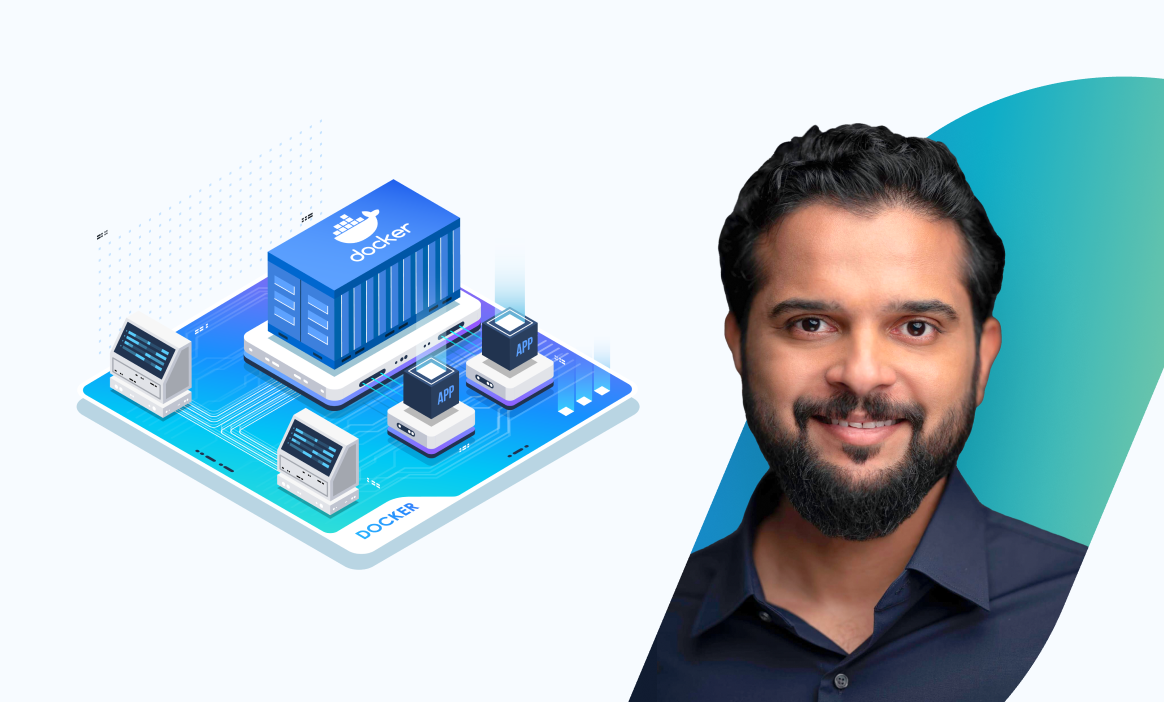What Is Docker in DevOps & How Does It Work?
One of the core technologies that has transformed application development is Containerization. It involves packaging software applications and all their dependencies into a single, self-contained unit known as a container. This makes managing, testing, deploying, and scaling an application easier.
The most commonly used containerization tool is Docker. This article will explore the role of Docker in DevOps.
What is Docker?
Docker is an open-source tool used for packaging applications and their dependencies into containers. It also provides a way to manage and orchestrate containerized applications, allowing users to easily deploy and manage their applications using Docker tools such as Docker Swarm. In simple words, Docker simplifies creating, deploying, packaging, and shipping applications.
Containers existed way before Docker. But Docker made everything easier with a rather simple approach - not to say that it was simple for the developers to write this utility - but it was simple for users to manage containers with it.
Try the Docker Run Lab for free

The Benefits of Using Docker:
Below are some of the benefits we get from using Docker:
- High ROI and cost savings
- Productivity and standardization
- Maintenance and compatibility
- Rapid deployment
- Faster configurations
- Seamless portability
- Continuous testing and deployment
- Isolation, segregation, and security
Containerization vs. Virtualization
Virtualization and containerization are popular because they let you easily run and scale applications in different environments. Although virtualization and containerization are somewhat similar, they are fundamentally different technologies.
Virtualization and containerization offer different levels of isolation. Virtualization creates a virtual machine that acts as a standalone separating system that emulates low-level hardware devices like CPU, disk, and networking devices. On the other hand, containerization does not emulate low-level hardware devices and relies on the host operating system to create lightweight virtual machines called containers.
In terms of security, virtualization is more secure than containerization. If one of the virtual machines is being exploited, the other virtual machines are still safe because virtual machines are completely separate from each other. With containerization, containers share the same underlying system hardware with the host machine. If one of the containers is exploited, other running containers and the host machine are put at risk.
Virtualization saves infrastructure costs by spanning multiple virtual machines on a single host server. However, it lacks support for application management and also requires a significant amount of resources to run.
Containerization, on the other hand, allows you to easily bundle your application code with all the dependencies it requires to run. With that said, you should use containerization for building software applications.
To learn about when to use containerization and when to use virtualization, read this blog: Virtualization vs. Containerization.
Before talking about how Docker integrates with and simplifies DevOps, let's briefly discuss DevOps and its uses.
What is DevOps?
DevOps is a set of practices and tools that combines and enhances the ability of the company’s software development (Dev) team and IT operations (Ops) to deliver high-quality and reliable software to their customers at a very high rate. It harnesses the power of collaboration and automation to create a virtually seamless pipeline linking coding, testing, and deployment.
DevOps Befits:
Below are some of the befits enjoyed by companies that adopt DevOps practices.
Technical advantages:
- Fast and continuous software delivery
- Quicker resolution of problems
- Reduced management complexities
Business advantages:
- Fast feature delivery
- Enhanced collaboration and communication
- More time for creativity and innovation
- Stable operating environments
Cultural benefits:
- Happier, productive. and collaborative teams
- Improved employee engagement
- More growth opportunities
Docker in DevOps
Docker is a tool that's positioned between developers and operations personnel. Thanks to Docker, developers can hand over to the operations team an application - packaged as an image - that can run seamlessly run on any environment (testing, staging, or production). It guarantees that if a feature functions in the development environment, it will also work in the production and staging environments.
Docker eliminates friction between the two teams and eases the work of automating steps such as testing, staging, and deployment. This helps accelerate application development and improves the overall performance of applications in a production environment.
Docker Images
One of the key components of Docker is the Docker image, which acts as a blueprint for creating containers. A Docker image is a static file containing everything needed to run an application, including the application code, libraries, dependencies, and the runtime environment. It's like a snapshot of a container that, when executed, creates a Docker container.
A Docker image is composed of multiple layers stacked on top of each other. Each layer represents a specific modification to the file system (inside the container), such as adding a new file or modifying an existing one. Once a layer is created, it becomes immutable, meaning it can't be changed. The layers of a Docker image are stored in the Docker engine's cache, which ensures the efficient creation of Docker images.
Best practices for creating Docker images
- Begin with an appropriate base image.
- Use multi-stage builds. If you want to use a Docker version that does not include multi-stage builds, try reducing the number of layers in your image.
- If you have multiple images that have a lot in common, you can create your own base image with shared components and then base your unique images on them.
- Use base images with minimal tools and utilities to keep production images lean.
- When you build images, consider tagging them with useful tags that codify the intended destination, version information, and stability.
- Avoid the use of untrusted base images
- Avoid building secrets into images
How Docker Improves the DevOps Approach?
One of the biggest benefits of using Docker in DevOps is that developers, testers, and system admins all use it. For instance, developers can use Dockerfiles to create Docker images on local computers and run them. The system administrators can use the same Docker images in the staging and production environments.
This approach offers several benefits, as discussed below.
Benefits of using Docker in DevOps
Docker and DevOps both intend to promote collaboration among various teams involved in a software life cycle. Although the two platforms offer a broad range of development, business, and cultural benefits, they have some drawbacks as well. The good news is these pitfalls can be overcome by using the two concepts together.
Here are some key benefits of using Docker in DevOps
- You get a high level of control over all the changes because they are made using Docker containers and images. Thus, you can return back to the previous version whenever you want to.
- With Docker, you get a guarantee that if a feature works in one environment, it will also work in others.
- When used with DevOps, Docker simplifies the process of creating application topology embodying various interconnected components.
- It makes load-balancing configuration easier with Ingress and built-in service concepts.
ENROLL in our top-rated Docker Training Course for Absolute Beginners.

Conclusion
Docker is a revolutionary technology that simplifies containerization, which is a crucial part of modern application development. Docker in DevOps provides a seamless link between Development and IT operations teams. The security, scalability, and simplicity it brings to an application development cycle make it a must in the DevOps environment.
People are also reading:

